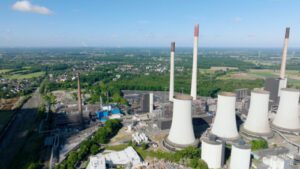Thyssenkrupp Uhde GmbH (Dortmund, Germany) and Uniper SE (Düsseldorf, Germany) are entering into a strategic partnership to bring a key technology for global hydrogen trading to industrial maturity: the large-scale ammonia cracker. In an ammonia cracker, ammonia is catalytically broken down into its components, hydrogen and nitrogen, at high temperatures, and pure hydrogen is then produced in a purification process. In a first step, a demonstration plant with a capacity of 28 tons of ammonia per day will be built at Uniper’s Gelsenkirchen-Scholven site in Germany. The plant will be one of the first of its kind in the world and will serve as the basis for the planned hydrogen import terminal in Wilhelmshaven, northwestern Germany, where the technology is to be applied on a large industrial scale in a second step.
The aim of the partnership is to convert imported ammonia into hydrogen on an industrial scale and make it available for a wide range of industries such as energy, steel, and chemicals. The cooperation marks an important step towards strengthening energy security and the sustainable transformation of energy-intensive industries. The use of ammonia as a transport and storage medium makes it possible to provide green or low-carbon hydrogen from global production sites in large quantities at low cost – a prerequisite for the successful ramp-up of the hydrogen economy.

Uniper’s Gelsenkirchen-Scholven site in Germany (Source: Uniper)
Holger Kreetz, COO of Uniper: “Uniper is actively committed to establishing hydrogen as an important component of the future energy mix that combines security and sustainability. Our aim is to strengthen the resilience of the economy. In order to meet Germany’s future hydrogen needs, we are dependent on imports from abroad. The partnership between Uniper and thyssenkrupp Uhde is therefore an important milestone for the hydrogen ramp-up and the decarbonization of industry. With the ammonia cracker in Scholven, we’re laying the groundwork to trade hydrogen internationally and making it available across industries.”
Nadja Håkansson, CEO of thyssenkrupp Uhde: “Uniper’s position as a leader in the energy markets and experienced asset operator, combined with our proven track record as a global leader in ammonia technology and large-scale plant delivery, forms a strong foundation for success. This joint capability ensures that the cracker plant is optimized not only for performance and efficiency but also for safety, long-term reliability, and total lifecycle cost. This integrated approach ensures a high level of confidence across the industry that the plant will consistently deliver top-tier operational performance throughout its entire lifecycle.”
The project is supported by funding from the state of North Rhine-Westphalia to realize innovative components of the demonstration plant at the Scholven site. The plant serves to gain knowledge for the subsequent construction of a large-scale commercial plant. Both companies are also contributing significant funds of their own.
Mona Neubaur, Minister for Economic Affairs, Industry, Climate Protection, and Energy of the State of North Rhine-Westphalia: “Hydrogen is one of the key technologies for the future viability of our industry in North Rhine-Westphalia. Like no other federal state, we need energy and raw materials for our economy and prosperity. With the help of ammonia cracking technology, we are opening up the possibility of obtaining green energy from numerous regions around the world. In doing so, we are strengthening the resilience of our business location and demonstrating how sustainability and security of supply can work together.”
Ammonia cracking technology is regarded as the missing element for a functioning global hydrogen infrastructure. As ammonia has a significantly higher energy density by volume and is easier to transport than pure hydrogen, it is ideally suited as a carrier medium. As a raw material for fertilizers, ammonia has been traded worldwide in large quantities and transported by ship for decades. If low-carbon hydrogen is converted directly into ammonia at the production site, this infrastructure can be easily utilized. Cracking allows the hydrogen to be reconverted at the destination and used in a climate-friendly way.
Following successful development and tests on a laboratory scale, the construction and operation of the “demo cracker” are now important steps towards large-scale implementation. During operation, data is obtained that is needed for further optimization of the technology as well as for scaling up to industrial scale in order to build the first commercial plant.
The cracker will be built on Uniper’s power plant site in Gelsenkirchen-Scholven, where new, sustainable projects are to be developed. All official approvals required for the construction and operation of the demo cracker have been obtained. Construction has started, and commissioning is planned for the end of 2026.